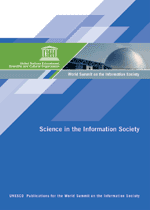Cultural diversity is seen as part of humanity's common heritage, which, as a source of exchange, innovation and creativity, is as essential for humankind as biodiversity is for nature. It should therefore be protected for the benefit of both present and future generations and be considered as a basic human right.
Publication year: 2003
The UNESCO Secretariat initiated the present draft guidelines intended to define, and promote understanding and debates on, the meaning of the public domain of information, and to assist Member States to develop policies and strategies in this area, which respond both to national needs and international practices.
Publication year: 2003
This document aims to clarify some of the key concepts and issues that surround the debate and presents in a simplified and synthetic form the many declarations and recommendations that have made reference to the issues of languages and education. These are stated as UNESCO guidelines and principles.
Publication year: 2003
This publication aims to make known the potential of ICTs to expand and improve teaching and learning in a wide variety of contexts, with a specific focus on developing regions and UNESCO's initiatives.
Publication year: 2003
The right to freedom of information, commonly understood as the right to access information held by public bodies, is now widely recognised as a fundamental human right. This study presents (1) an overview of international basis for this right; (2) the best practice standards; (3) the analyses of the laws of 10 different countries; and (4) a comparative analysis of the various laws/policies.
Publication year: 2003
ICTs could give a major boost to the economic, political and social empowerment of women, and the promotion of gender equality. But that potential will only be realized if the gender dimensions of the Information Society - in term's of users' needs, conditions of access, policies, applications and regulatory frameworks - are properly understood and adequately addressed by all stakeholders.
Publication year: 2003
These Guidelines form a small part of a far-seeing campaign by UNESCO to improve access to digital heritage for all the world’s peoples, and to ensure that the means of preserving their digital heritage are in the hands of every community.
Publication year: 2003
An African ICT Training Kit indigenously adapted for local educational needs. An education and development library on pedagogical practice and educational content for basic needs.
Publication year: 2003
Internet para principiantes (Internet for Beginners) is available in Spanish version only.
Publication year: 2003
The aim of this inquiry is a comparative study of recent legislation on community radio broadcasting in different countries of the world. It does not claim to be an exhaustive guide to legislation in this field – an undertaking that would exceed our ambitions – but rather an analysis that seeks to highlight certain similarities and differences between the general legislative background to community radio broadcasting in recent years in 13 countries.
Publication year: 2003
This report focuses on data systems and measurement issues with regard to ICT, including aspects of data availability, international comparability and quality, as well as their content.
Publication year: 2003
The Internet sharpens the issues of the digital world and heritage. It obliges us to reconsider all our certainties about the very meaning of the word “preserve”, a meaning which comes to us from the remotest of past ages when humans for the first time inscribed what they knew on objects that were longer-lasting than they were, so that their memory could traverse the generations and reach us.
Publication year: 2003
In a world where emphasis is placed on speed, and where everything is becoming increasingly confused and hurried, we have to take the time to conserve the images of those things defining our roots, our past and our exis tence. To this end, in 1992, UNESCO launched the “Memory of the World” Programme.
Publication year: 2010
The preparations for the World Summit on the Information Society have undoubtedly enhanced awareness among governments of the important role science and engineering play in building the information society and in contributing to the development of a knowledge society.
Publication year: 2003
A focus on research conducted internationally on gender and the use of ICTs. A brief analysis of various research studies on the main trends identified, and some recommendations for future investigations.
Publication year: 2003
This publication is an initial inventory of professional development and teacher training programmes on ICT from selected countries in Asia and the Pacific. This is an ongoing project, whose final goal is to benefit countries in the region in improving their teacher training activities in ICT.
Publication year: 2003
Ten Steps for establishing a sustainable Multipurpose Community Telecentre (MCT) is intended to assist comunities to walk through the basic requirements which need to be addressed when setting out to open and operate a successful MCT.
Publication year: 2002
One of UNESCO’s fundamental activities is the drafting of charters, declarations and recommendations intended to present the essence of its proposals for action in its fields of competence. This publication presents a selection of quotations from the Organization’s official texts, originating from all its programme sectors, which contribute to defining what the information society ought to be, without reducing the debate to purely technical issues.
Publication year: 2003














